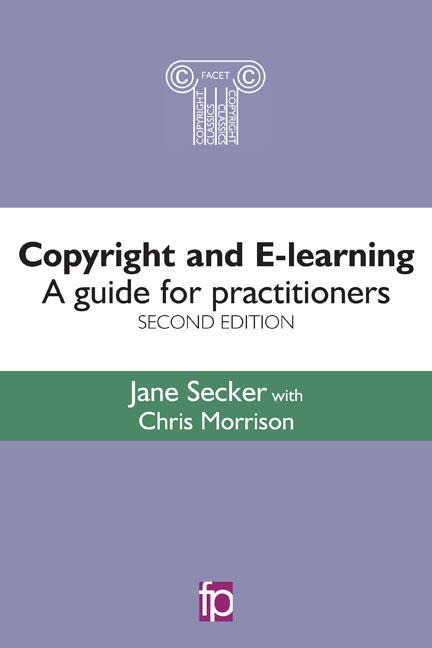Book contents
- Frontmatter
- Contents
- Figures, tables and case studies
- Preface to the second edition
- Introduction
- Abbreviations and acronyms
- Glossary
- 1 E-learning and copyright: background
- 2 Digitizing text-based content for delivery in a VLE
- 3 Using digital media: video, images, sound and software
- 4 Copyright issues and born digital resources
- 5 Copyright in the connected digital environment
- 6 Copyright education and training
- 7 Conclusion
- Further resources
- Index
7 - Conclusion
Published online by Cambridge University Press: 08 June 2018
- Frontmatter
- Contents
- Figures, tables and case studies
- Preface to the second edition
- Introduction
- Abbreviations and acronyms
- Glossary
- 1 E-learning and copyright: background
- 2 Digitizing text-based content for delivery in a VLE
- 3 Using digital media: video, images, sound and software
- 4 Copyright issues and born digital resources
- 5 Copyright in the connected digital environment
- 6 Copyright education and training
- 7 Conclusion
- Further resources
- Index
Summary
This book has considered a wide range of copyright issues associated with online learning. It has sought to provide practical advice for those working in education and to give readers a working knowledge of copyright law as it applies in this field. Copyright and e-learning is a compelling and complex subject. Copyright exceptions provide special privileges for research and education, yet despite the best efforts of governments around the world, people still struggle to interpret how the law applies to new technologies. The problems arise from the inherent nature of digital technology and the ease with which it allows information and knowledge to be shared. The very reasons why educators want to teach online – to open up education, to break down geographical and physical barriers to learning – are some of the reasons why those in the cultural industries fear technology. Sharing information in a digital format allows it to be freely distributed and not easily controlled, and therefore attempts are made by commercial publishers and other media organizations to lock information through digital rights management technologies.
There have been many developments in the six years since this book was first published. The law has been updated around the world, most notably in the UK, and there has been a major shift in scholarly com - munications with a continuing growth in the uptake of open access publishing models. We have also seen the embedding of cloud-based and ‘always connected’ technologies, along with the widespread use of social media, changing the way people communicate and share information. We have seen a proliferation of digital devices, the introduction of wearable technologies and the generation of data on a massive scale. In the education field we have seen increased globalization, increasing commoditization of education as a product and ‘experience’, the rise of MOOCs, and in many countries a decline in public sector funding of higher education.
Clearly copyright and e-learning is still an area of considerable interest and concern, and many people are uncertain about what they or their institutions should be doing. Arguably many of the fears and anxieties about copyright stem from people approaching it as a rigid and unhelpful framework that they try to apply as an afterthought. There is much that could be gained if copyright were reframed in the wider context of the practical and philosophical considerations that come into play in any educational establishment.
- Type
- Chapter
- Information
- Copyright and E-learninga guide for practitioners, pp. 239 - 244Publisher: FacetPrint publication year: 2016



